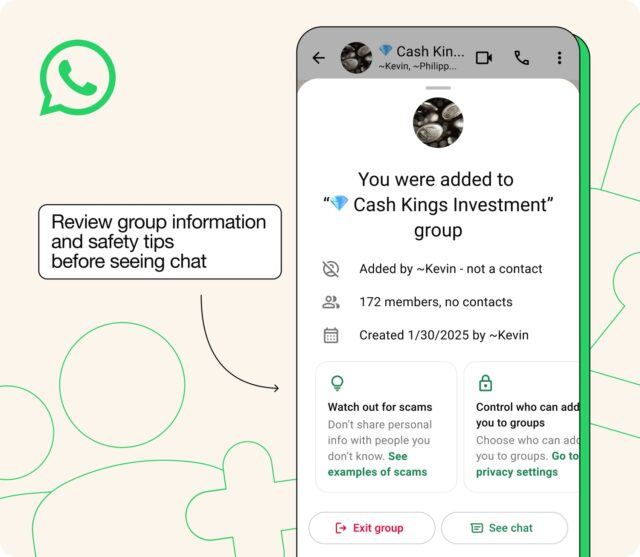WhatsApp launches new tools to stop scammers

WhatsApp is now an essential communication tool for both personal and business use, and its popularity means that it is also a prime target for scammers. As such, the company has just announced the rollout of a new series of tools designed to help keep users informed and protected.
Among these new tools is a safety warning for group chats that warns about being added to new chat groups by unknown contacts. There are also tools and advice for individual chats, which are also targets for scams.
While far from offering complete protection, the idea behind the new protections are to shield people from known scams.
Outlining the individual and group safety features, WhatsApp explains:
Group messaging: We’re launching a new safety overview that we’ll show you when someone who is not in your contacts adds you to a new WhatsApp group you may not recognize. It will include key information about the group and tips to stay safe. From there, you can exit the group without ever having to look at the chat. And if you think you might recognize the group after seeing the safety overview, you can choose to see the chat for more context. Regardless, notifications from the group will be silenced until you mark that you want to stay.
Individual messaging: Additionally, scammers may attempt to first initiate contact with you elsewhere on the internet before asking to message them on private messengers like WhatsApp. To protect against this tactic, we continue to test new approaches to alerting people to pause before engaging. For example, we’re exploring ways to caution you when you start a chat with someone not in your contacts by showing you additional context about who you’re messaging so you can make an informed decision.
In delivering the new tools, WhatsApp also shares some information about the work it has been doing, both on its own and in conjunction with other companies and organizations. One collaboration saw WhatsApp working with OpenAI:
As an example, recently WhatsApp, Meta and our peers at OpenAI disrupted scams efforts which we were able to link to a criminal scam center in Cambodia. These attempts ranged from offering payments for fake likes to enlisting others into a rent-a-scooter pyramid scheme, or luring people to invest in cryptocurrency. As OpenAI reported, the scammers used ChatGPT to generate the initial text message containing a link to a WhatsApp chat, and then quickly directed the target to Telegram where they were assigned a task of liking videos on TikTok. The scammers attempted to build trust in their scheme by sharing how much the target has already ‘earned’ in theory, before asking them to deposit money into a crypto account as the next task.
WhatsApp also has some advice that it believes users should keep in mind at all times in order to avoid falling victim to scams on the platform:
- PAUSE: Take time before you respond. Think about whether this is a number you recognize, or whether it reads like a legitimate ask.
- QUESTION: Does this request make sense? Does it seem too good to be true? Are they asking you to send money, gift cards or PIN codes? Are they offering unrealistically high pay for a few hours of work? Are they rushing you into taking action? These might be signs of a scam.
- VERIFY: If they’re claiming to be a friend or family member, make sure that they are who they say they are by contacting that friend directly – ideally using another method of communication. For example, if they messaged you on WhatsApp, call them on their phone – or if they sent you an SMS, give them a WhatsApp call using the phone number you know is theirs.
